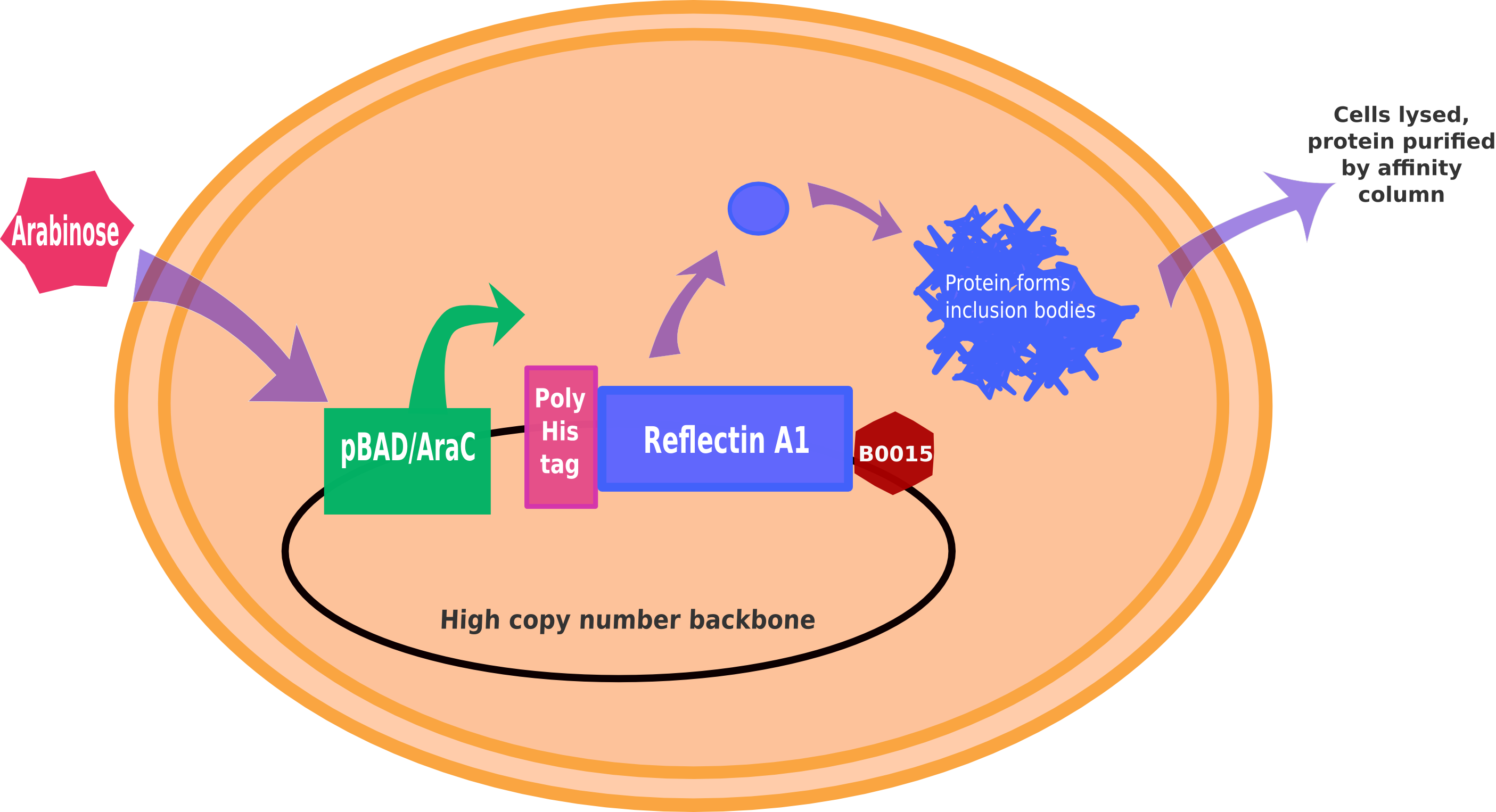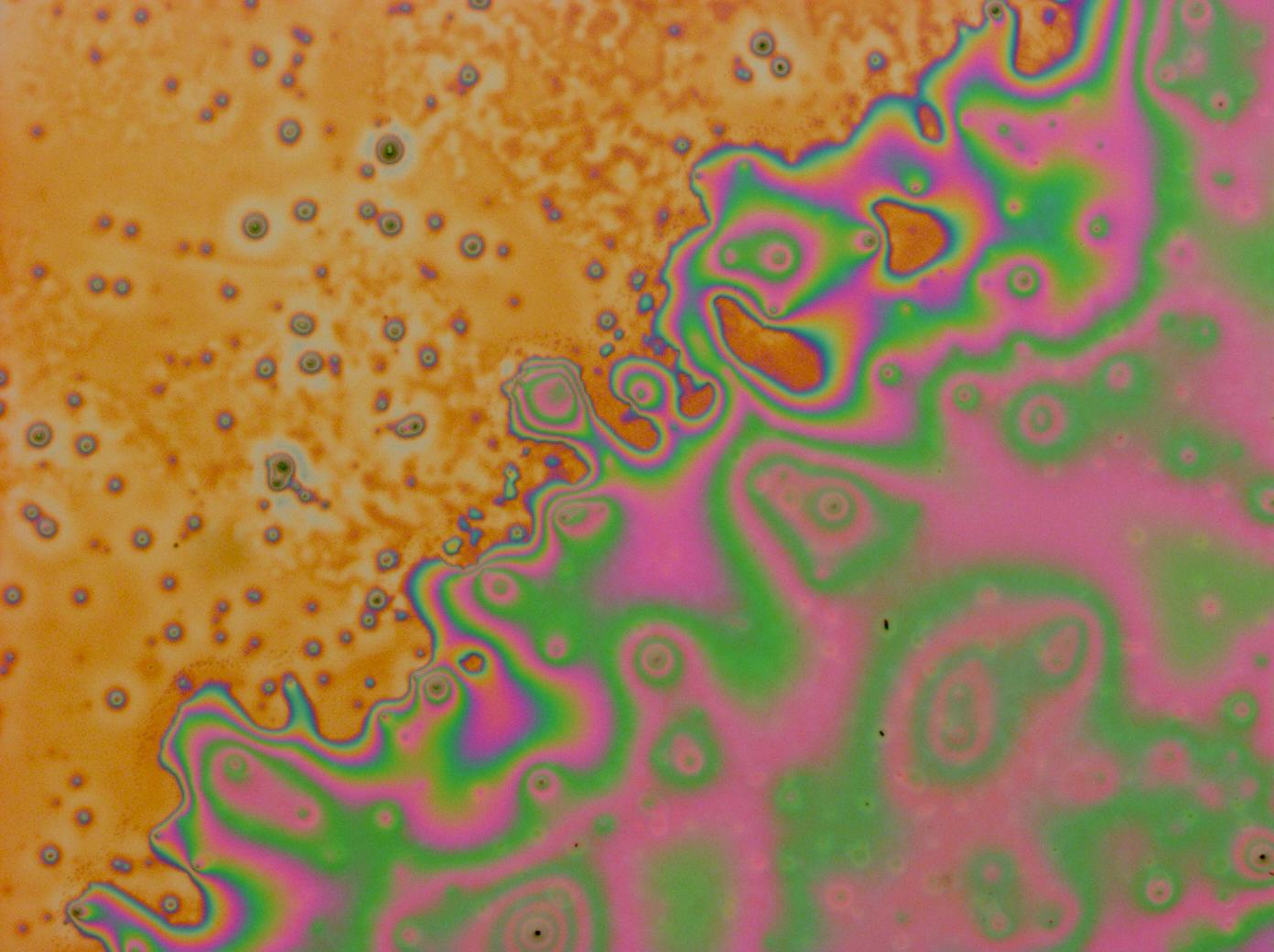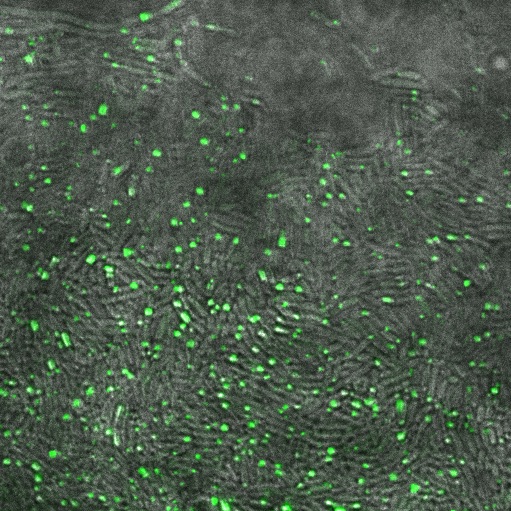Team:Cambridge/Parts
From 2011.igem.org
(→...and the rest) |
(→Reflectin A1 GFP fusion) |
||
| (11 intermediate revisions not shown) | |||
| Line 5: | Line 5: | ||
===Overexpression for purification=== | ===Overexpression for purification=== | ||
| - | [[File:Cam_Overexpression_Construct.png | 600px]] | + | [[File:Cam_Overexpression_Construct.png | center | 600px]] |
| + | |||
===Export=== | ===Export=== | ||
| - | [[File:Cam_Export_Construct.png | 600px]] | + | [[File:Cam_Export_Construct.png | center | 600px]] |
==Featured Parts== | ==Featured Parts== | ||
| Line 16: | Line 17: | ||
Reflectins are a family of proteins which help give cephalopods their amazing camouflage abilities and which can self-assemble into a variety of multilayered structures with optical properties. We worked with Reflectin A1 from Loligo pealeii. See our [[Team:Cambridge/Project/Background | background page]] for more information about reflectins and their role in cephalopod camouflage. | Reflectins are a family of proteins which help give cephalopods their amazing camouflage abilities and which can self-assemble into a variety of multilayered structures with optical properties. We worked with Reflectin A1 from Loligo pealeii. See our [[Team:Cambridge/Project/Background | background page]] for more information about reflectins and their role in cephalopod camouflage. | ||
| - | + | In order to isolate pure reflectin, we built and submitted [http://partsregistry.org/wiki/index.php?title=Part:BBa_K638202 Poly-His tagged Reflectin A1 generator]. In pure form reflectins may be used to create [[Team:Cambridge/Project/In_Vitro | vibrantly coloured thin films]] and other devices. We used a poly-His affinity column to purify reflectin from cells for this purpose. | |
| - | In pure form reflectins may be used to create [[Team:Cambridge/Project/In_Vitro | vibrantly coloured thin films]] and other devices. We used a poly-His affinity column to purify reflectin from cells for this purpose. | + | <br style='clear:both' /> |
| + | [[File:Cam Reflectin-GFP-inclusionbodies.jpg | thumb | 175px | left | ''E. coli'' transformed with our pBAD-ReflectinA1-GFP construct]] | ||
| + | |||
| + | ===[http://partsregistry.org/wiki/index.php?title=Part:BBa_K638301 Reflectin A1 GFP fusion]=== | ||
| + | This BioBrick was created in order for us to control for the expression of reflectin and its location in the cell. Using it, we were able to determine that reflectin forms [[Team:Cambridge/Project/In_Vitro#Over-Expression | inclusion bodies]] when expressed at a high level. | ||
===[http://partsregistry.org/wiki/index.php?title=Part:BBa_K638402 Improved TorA tag]=== | ===[http://partsregistry.org/wiki/index.php?title=Part:BBa_K638402 Improved TorA tag]=== | ||
We submitted a variant of the TorA leader sequence export tag. This TorA leader sequence variant has had been successfully used to export GFP to the periplasm of E.coli as described [http://www.ncbi.nlm.nih.gov/pubmed/11123687 here]. Our tag differs slightly from [http://partsregistry.org/wiki/index.php?title=Part:BBa_K233307 the TorA tag already in the registry] and should be cheaper to obtain from primer synthesis. | We submitted a variant of the TorA leader sequence export tag. This TorA leader sequence variant has had been successfully used to export GFP to the periplasm of E.coli as described [http://www.ncbi.nlm.nih.gov/pubmed/11123687 here]. Our tag differs slightly from [http://partsregistry.org/wiki/index.php?title=Part:BBa_K233307 the TorA tag already in the registry] and should be cheaper to obtain from primer synthesis. | ||
| - | + | <br style='clear:both' /> | |
| - | + | We also submitted [http://partsregistry.org/wiki/index.php?title=Part:BBa_K638401 Reflectin A1 with N-terminal TorA tag] and [http://partsregistry.org/wiki/index.php?title=Part:BBa_K638403 Reflectin A1 with N-terminal TorA tag and C-terminal sfGFP], which we used in our [[Team:Cambridge/Project/In_Vivo#Periplasmic_Export | periplasm export]] attempt. | |
| - | + | ||
| - | + | ||
===...and the rest=== | ===...and the rest=== | ||
| - | A complete list of parts submitted to the Registry by this year's Cambridge team | + | A complete list of parts submitted to the Registry by this year's Cambridge team can be found below. |
(We also added our [http://partsregistry.org/Part:BBa_I0500:Experience experience of part I0500] to the registry.) | (We also added our [http://partsregistry.org/Part:BBa_I0500:Experience experience of part I0500] to the registry.) | ||
| + | <html> | ||
| + | <link rel="stylesheet" type="text/css" href="/common/tablesorter/themes/groupparts/style.css" /> | ||
| + | </html> | ||
<groupparts>iGEM011 Cambridge</groupparts> | <groupparts>iGEM011 Cambridge</groupparts> | ||
{{Template:Team:Cambridge/CAM_2011_TEMPLATE_FOOT}} | {{Template:Team:Cambridge/CAM_2011_TEMPLATE_FOOT}} | ||
Latest revision as of 00:16, 22 September 2011
Contents |
System diagrams
Our parts were designed for the two main branches of our labwork - in vivo expression and export to try and achieve structural colour, and overexpression for purification and in vitro studies of our recombinant reflectins.
Overexpression for purification
Export
Featured Parts
[http://partsregistry.org/wiki/index.php?title=Part:BBa_K638001 Reflectin A1]
Reflectins are a family of proteins which help give cephalopods their amazing camouflage abilities and which can self-assemble into a variety of multilayered structures with optical properties. We worked with Reflectin A1 from Loligo pealeii. See our background page for more information about reflectins and their role in cephalopod camouflage.
In order to isolate pure reflectin, we built and submitted [http://partsregistry.org/wiki/index.php?title=Part:BBa_K638202 Poly-His tagged Reflectin A1 generator]. In pure form reflectins may be used to create vibrantly coloured thin films and other devices. We used a poly-His affinity column to purify reflectin from cells for this purpose.
[http://partsregistry.org/wiki/index.php?title=Part:BBa_K638301 Reflectin A1 GFP fusion]
This BioBrick was created in order for us to control for the expression of reflectin and its location in the cell. Using it, we were able to determine that reflectin forms inclusion bodies when expressed at a high level.
[http://partsregistry.org/wiki/index.php?title=Part:BBa_K638402 Improved TorA tag]
We submitted a variant of the TorA leader sequence export tag. This TorA leader sequence variant has had been successfully used to export GFP to the periplasm of E.coli as described [http://www.ncbi.nlm.nih.gov/pubmed/11123687 here]. Our tag differs slightly from [http://partsregistry.org/wiki/index.php?title=Part:BBa_K233307 the TorA tag already in the registry] and should be cheaper to obtain from primer synthesis.
We also submitted [http://partsregistry.org/wiki/index.php?title=Part:BBa_K638401 Reflectin A1 with N-terminal TorA tag] and [http://partsregistry.org/wiki/index.php?title=Part:BBa_K638403 Reflectin A1 with N-terminal TorA tag and C-terminal sfGFP], which we used in our periplasm export attempt.
...and the rest
A complete list of parts submitted to the Registry by this year's Cambridge team can be found below. (We also added our [http://partsregistry.org/Part:BBa_I0500:Experience experience of part I0500] to the registry.) <groupparts>iGEM011 Cambridge</groupparts>
 "
"




